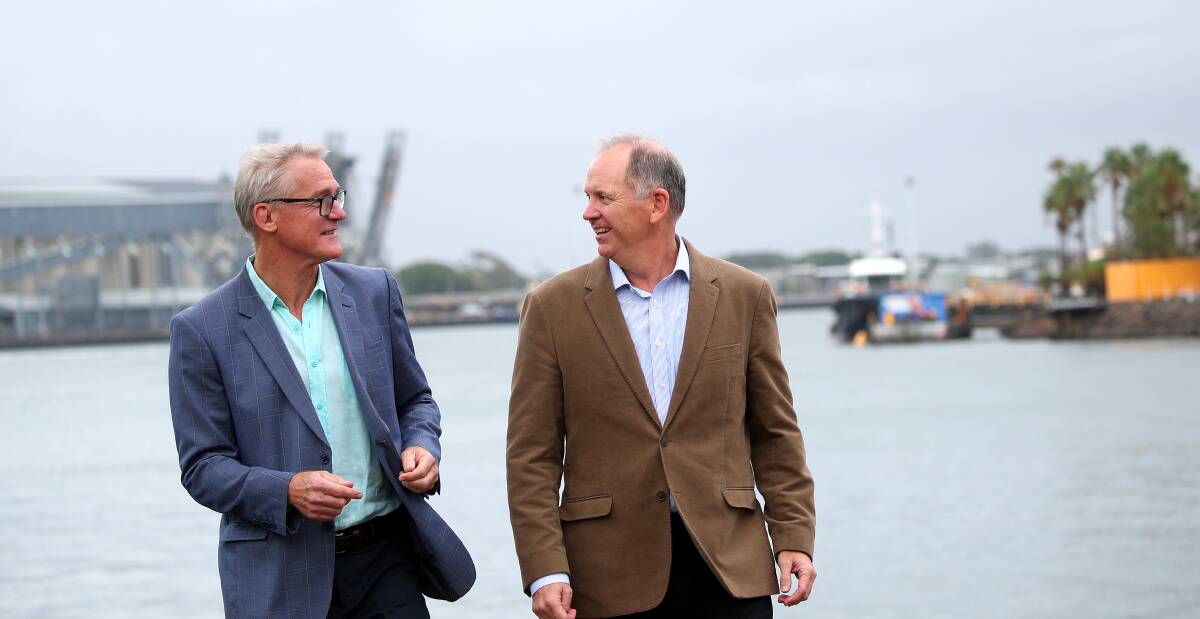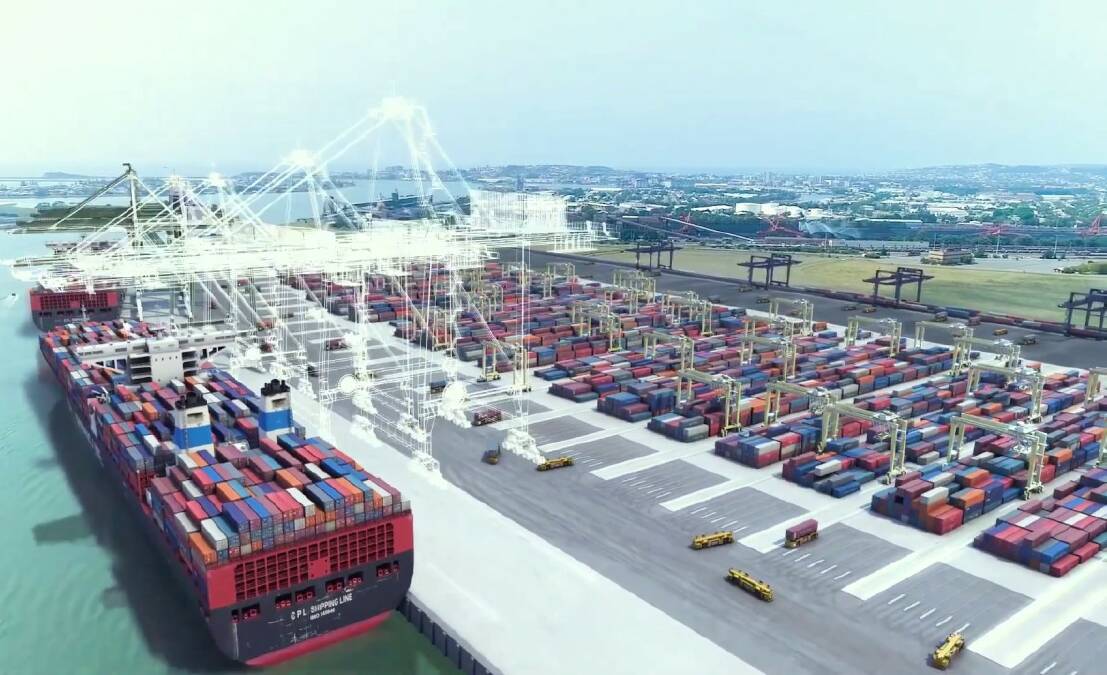
The door is open to Port of Newcastle developing a large-scale container terminal at Mayfield after the NSW independent pricing tribunal ruled it must pay only $13 million in compensation to the state government.
The Independent Pricing and Regulatory Tribunal ruling on Friday comes after Parliament passed legislation in November 2022 giving Port of Newcastle a pathway to removing controversial penalties on Newcastle competing for container traffic against Port Botany and Port Kembla.
Port chief executive Craig Carmody said on Friday that he and his staff were "incredibly happy" with the IPART ruling and he had called an extraordinary board meeting in the next fortnight to gain owner approval to pay the compensation.
"I would be amazed if they said no given we've already invested $35 million in Mayfield to do containers," he said.
"It's just a great day for the port and the region."
Mr Carmody said he "literally had goosebumps" after finding out the compensation amount on Thursday.

The $13 million figure is well below expectations.
Mr Carmody told the Newcastle Herald last year that a contract top-up figure of $1 billion would render the project unviable.
NSW Treasury last month published modelling by Deloitte Access Economics which suggested the state's liability to Botany and Kembla owner NSW Ports could range between $600 million and $4.3 billion should the Newcastle container terminal proceed.
Mr Carmody said the port believed the $600 million figure was "ridiculously inflated".
"I always said it should be somewhere between zero and $50 million," he said.
The former Coalition government sold 99-year leases to Port Botany and Port Kembla for $4.31 billion and $760 million respectively in 2013.
The following year it sold a 98-year lease to the Port of Newcastle consortium for $1.75 billion.
Secret agreements
The lease agreements contained confidential container penalties designed to boost the value of Botany and Kembla.
The state is liable for compensating NSW Ports if a Newcastle freight terminal handles containers above a set cap. Port of Newcastle must compensate the state for any payments it makes to NSW Ports.
The Newcastle Herald revealed the existence of the secret penalties in 2016, sparking a political bun fight over the government's privatisation agenda.
NSW Treasurer Daniel Mookhey said privatising the state's ports had left taxpayers potentially on the hook for hundreds of millions in payments to NSW Ports.
A statement from the Treasurer said the port sell-off had been a "complex, costly and disastrous decision that future generations in NSW will end up paying for".
"The Hunter region should always have been able to decide the future of its port free from any competitive restraint," Mr Mookhey said.
"It would have been preferable to have had an elected government making decisions that affect the people of NSW."
Port of Newcastle has argued the container penalties have prevented it from investing in a large-scale freight terminal at Mayfield.
IPART said on Friday that the compensation payment to the NSW government would "remove the Port of Newcastle's liability to reimburse the state for compensation payments owed to NSW Ports if the Port of Newcastle handles container trade above a specified level".
IPART chair Carmel Donnelly said the tribunal had determined the value of the payment according to the requirements set out in the Port of Newcastle (Extinguishment of Liability) Act 2022.
"IPART was appointed under that legislation to determine this value and the law requires that determination to be made in a very specific way," she said.
IPART was required to determine how much the inclusion of the reimbursement provision would have reduced the financial value of the right to operate and lease the assets of Newcastle port for 98 years, in the opinion of a reasonable person, at the time the state entered into the Port of Newcastle deed.
"This could be described as what a reasonable person, bidding for the right to operate and lease the Port of Newcastle in 2014, would have reduced their bid by because of the requirement to reimburse the state for payments to NSW Ports," Ms Donnelly said.
"IPART was only allowed to consider information that could have been known in May 2014, when the transaction to privatise the Port of Newcastle was finalised."
Port of Newcastle, which is co-owned by China Merchants and The Infrastructure Fund, has said it stands ready to invest in its Newcastle Deepwater Container Terminal as it diversifies away from its main revenue source of coal exports.
'Lot of vested interests'
Mr Carmody said the state government's official freight policy, which was changed in 2013 to prioritise Kembla ahead of Newcastle as the next port to be developed as a container terminal once Botany reaches capacity, remained a potential barrier to the Newcastle project.
"That policy actually directs any planning approvals that Transport for NSW, NSW Planning and all them [other departments] have to consider," he said.
"That's something the government is alive to.
"We've already started the process that that policy needs to be changed for a level playing field.
"We're not asking for an advantage, but they've got to remove this nonsense of Botany, Kembla, Newcastle and just let the ports compete.
"That's our next campaign to get that changed, because otherwise I'll make my submission and they'll say it's not consistent with the planning policy."
Mr Carmody said Port of Newcastle believed NSW Ports could not challenge Newcastle's agreement with the state in the courts but was still prepared for a battle to develop the terminal.
"We are incredibly mindful that we are taking on a lot of vested interests in this," he said.
"When you think about the duopolies that operate down at Botany, the fight still has a long way to go.
"People won't just accept this. I expect we'll still have to fight every step of the way."
NSW Ports said the "extraordinarily low compensation value ... reaffirms that the state's container port policy remains fit-for-purpose".
"At a mere 0.6% of the total acquisition cost by the Port of Newcastle, the compensation value confirms that there is limited economic viability in a container terminal at Port of Newcastle," a spokesperson said.
"The billions of taxpayer dollars that would need to be spent on road and rail infrastructure to support a container terminal at Newcastle remains unjustified."
NSW Ports said the IPART determination backed up a Federal Court ruling in 2021 that developing a Newcastle container terminal was "fanciful, far-fetched, infinitesimal or trivial".
The court rejected an Australian Competition and Consumer Commission challenge that the container penalties were "illegal and anti-competitive".
"Once Port Botany reaches capacity, Port Kembla, as the next proximate location to the state's largest population and business centres, makes the most sense for a second container terminal," the NSW Ports spokesperson said.
The National Party and NSW Farmers industry body have joined in the port's push for a container terminal, arguing it will reduce freight costs for producers north of Sydney.
Lake Macquarie independent MP Greg Piper moved the legislation in Parliament in 2022 to unpick the compensation element of the privatisation deal.
Mr Piper said the IPART determination struck the right balance between "fair compensation and commercial viability for a container port in Newcastle".
"It's a fantastic result for the port, the region and communities extending right through to the state's north-western areas," he said.
"Manufacturers and farmers will be huge beneficiaries of a new and world-class container terminal when completed by the Port of Newcastle."
IPART's determination said the compensation figure was $10.12 million in 2014 dollars, or $13 million after allowing for inflation.
"From the date on which the operator of the Port of Newcastle makes this payment to the State, it will have no future liability to reimburse the State for compensation payments owed to NSW Ports if the Port of Newcastle handles container traffic above a specified level," the tribunal said.
IPART said any amount payable by the state government to NSW Ports "may be quite different to the amount IPART has determined the Port of Newcastle can pay the State to extinguish its liability".
"The amount of any compensation payable by the State to NSW Ports is calculated each year based on actual container throughput at the Port of Newcastle and wharfage charges at Port Botany and Port Kembla.
"IPART was not tasked with determining the amount payable under this separate 2013 arrangement."
Newcastle MP Tim Crakanthorp said IPART's decision amounted to a "very reasonable and manageable fee and a great opportunity to expand the Port of Newcastle's capacity".
"This container terminal would have a great benefit to the Hunter region and wider NSW," he said.
Level playing field
Business Hunter chief executive Bob Hawes said his organisation had long argued for a "level playing field" in the container market.
"If there is an opportunity for the port to offer container freight services, it should be left to the market to determine where it's cheaper and more efficient to freight materials," he said.
"This determination brings us significantly closer to realising that goal."
A Productivity Commission report last year noted "lack of competition in some parts of the marine logistics system" was contributing to inefficiency and costs.
Mr Hawes said businesses were experiencing pressure from sharp increases in freight costs, which ultimately dampened economic growth.
"A container facility in Newcastle will increase competition and give the market more choice and potentially address this concern," he said.
"That's got to be good for the economy, business and consumers.
"It's an issue greatly magnified for industries producing at scale, such as the agriculture sector stretching up into the state's north-west and particularly the grain growers.
"It's a matter of national importance."
Upper Hunter Nationals MP Dave Layzell welcomed the IPART decision and was "optimistic" the ruling had cleared the way for Port of Newcastle to make a significant investment decision in the terminal.
The Australian Competition and Consumer Commission launched an unsuccessful challenge to the container penalties in the Federal Court, claiming they were "illegal and anti-competitive".







